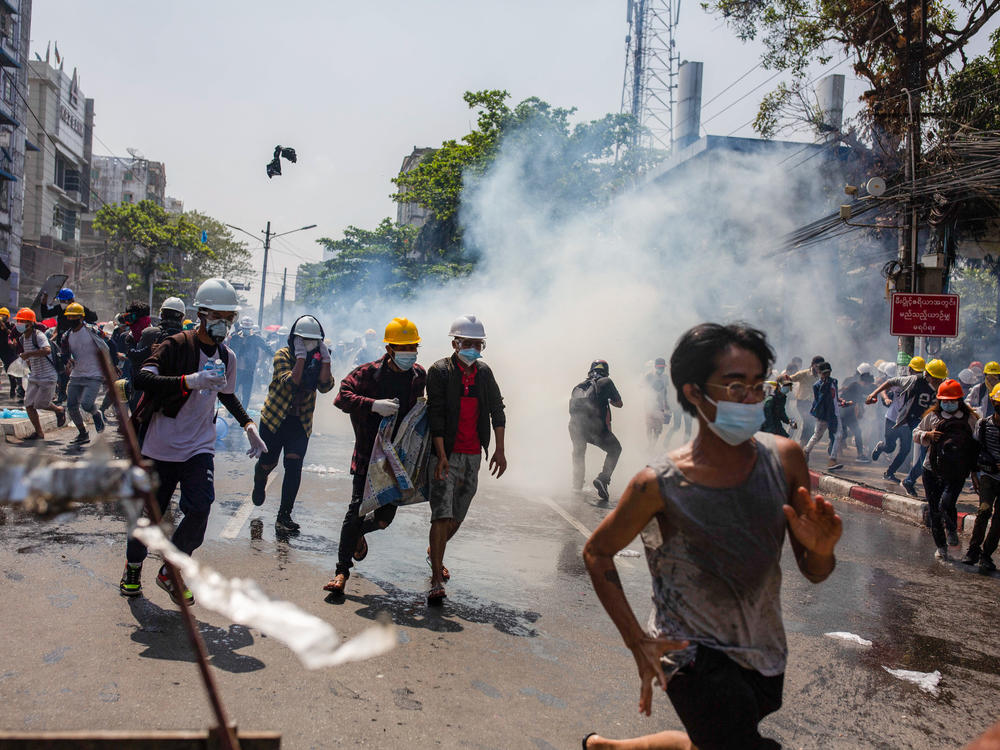Section Branding
Header Content
Myanmar's Suu Kyi Appears Before Court As Supporters Continue Protests
Primary Content
Myanmar's detained former leader, Aung San Suu Kyi, appeared for a court hearing Monday, a month after being ousted in a coup. Her supporters again staged protests calling for her release, despite a deadly crackdown by police.
After 18 people were reportedly killed and another 30 wounded by police in anti-junta demonstrations on Sunday in the bloodiest day since the Feb. 1 military takeover, supporters of Suu Kyi and her National League for Democracy, or NLD, party showed up on the streets once again to oppose the country's sudden relapse into authoritarianism.
Although scenes on Monday were less dramatic, police on Sunday reportedly fired rubber bullets, and in some cases live ammunition, along with tear gas to disperse protests in the major cities of Yangon, Mandalay and Dawei, where thousands have gathered in the weeks since the coup to oppose a return to military rule.
Social media have been flooded with images from Sunday's violence, showing bloodied protesters and footage of unarmed demonstrators retreating in the face of overwhelming police force. In one posted video, a man can be seen being beaten by several officers in full riot gear as gunfire echoes off the surrounding buildings.
The death toll from Sunday brings to 21 the number of people killed in protests in the past month, Reuters reports. There were no immediate reports of casualties from Monday's protests, but police fired tear gas and stun grenades in Yangon, the most populous city, witnesses told the news agency.
Junta leader Senior Gen. Min Aung Hlaing later went on state television to warn that "instigators" of the protests would be punished, Reuters reports.
Last month, the Biden administration announced that it was imposing sanctions against individual members of the junta. The United Kingdom has slapped similar sanctions and the European Union may do so as well.
The coup that toppled Suu Kyi, who held the title of state counselor and was the country's de facto leader, followed accusations by the military that November's elections were fraudulent. The polls, deemed largely free and fair by international observers, showed that the NLD trounced candidates allied to Myanmar's armed forces. Despite the military's poor showing, it is constitutionally guaranteed a minimum of one-quarter of all seats in the parliament.
Suu Kyi has not appeared in public since her arrest shortly after the coup. She was initially charged with illegally importing walkie-talkies, and charges of breaching coronavirus protocols were later added.
In Monday's hearing, Suu Kyi appeared via video conference before the court in the capital, Naypyitaw.
Lawyer Min Min Soe told Reuters that she "looks healthy" and that "she asked to meet her lawyer."
Suu Kyi spent a total of 15 years under house arrest during previous military regimes before winning the country's first free election in decades by a landslide in 2015.
During her years of house arrest, Suu Kyi became a cause célèbre and in 1991, while under house arrest, she was awarded the Nobel Peace Prize for her efforts to bring democracy to Myanmar, also known as Burma.
However, in recent years, she has come under harsh criticism for her seeming defense of a 2017 army crackdown in Myanmar's western Rakhine state directed at minority ethnic Rohingya Muslims. The attacks on civilians, which came in response to assaults on soldiers by Rohingya insurgents, has been described by the head of the United Nations Human Rights Council as a "textbook example of ethnic cleansing."
Copyright 2021 NPR. To see more, visit https://www.npr.org.

